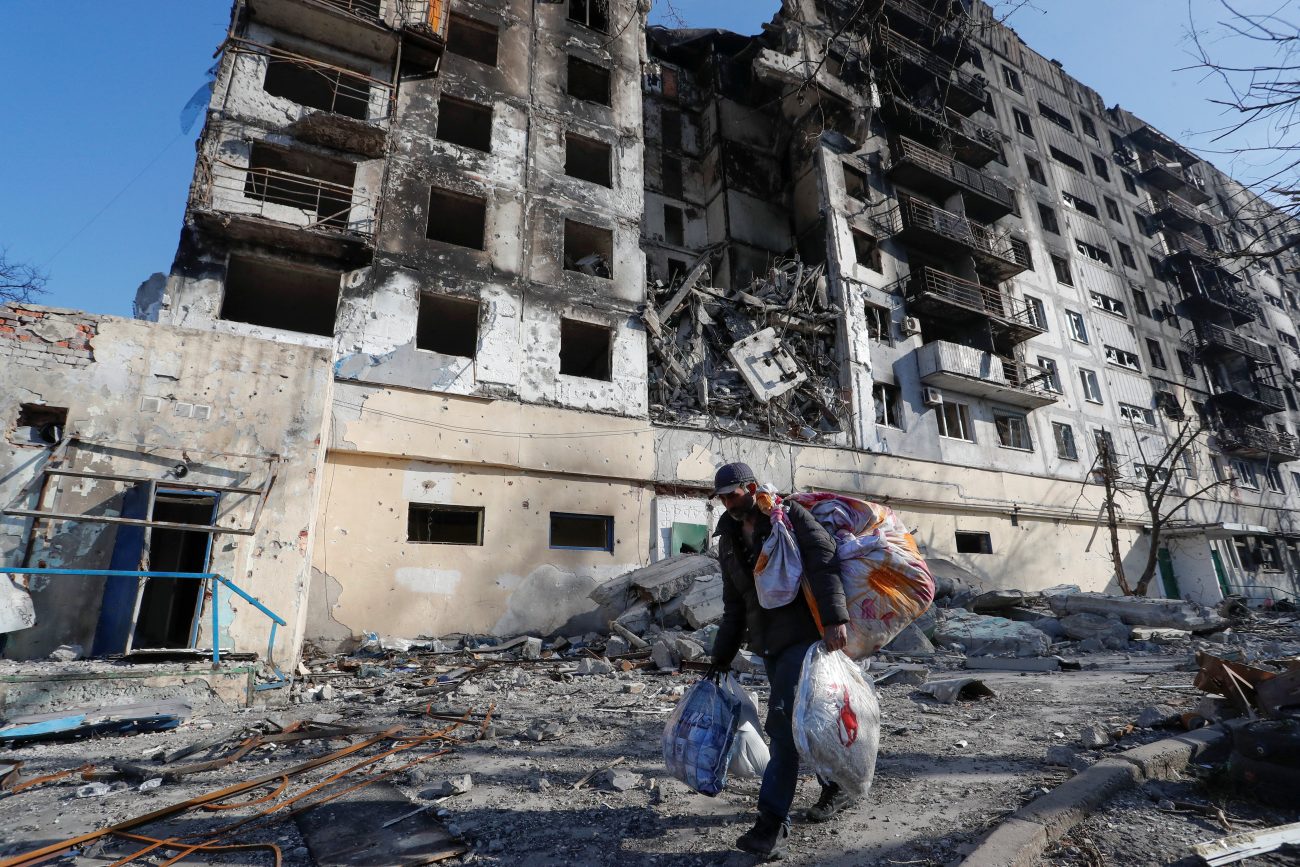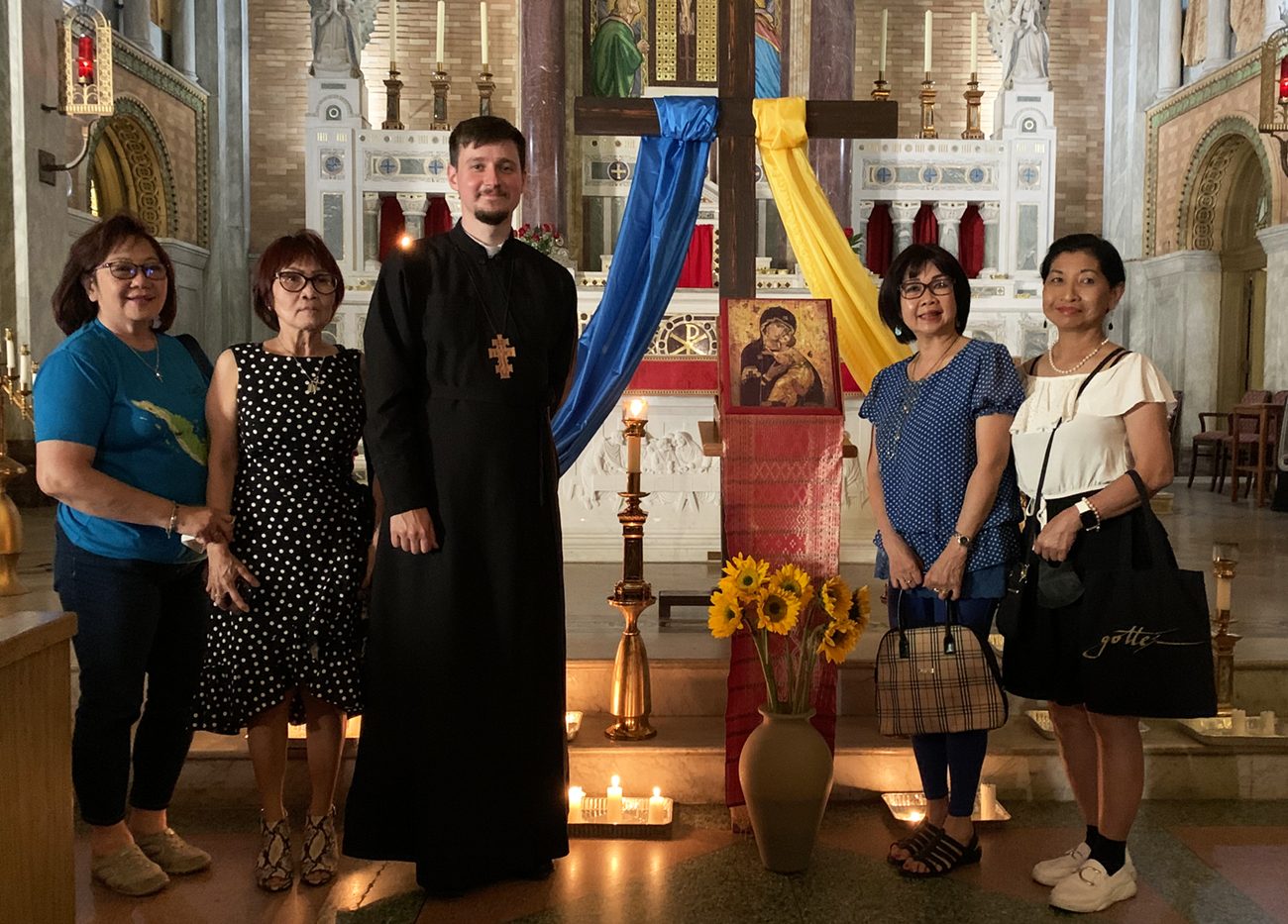Dozens of faithful from the area — and from around the world — recently came together to pray for the people of Ukraine, now in the fourth month of a brutal invasion by Russia that has killed thousands, displaced some 14 million and threatened global food supplies.
Sponsored by the archdiocesan Office for Pastoral Care of Migrants and Refugees (PCMR), the online “Pilgrimage Novena for World Peace,” held May 27 to June 4, drew participants from the Philadelphia region as well as New York, the Philippines and Africa for nightly recitations of the rosary.
[hotblock]
Accompanying the Marian devotion were images from and reflections on key sites of the war’s worst atrocities to date – a format similar to that of an April 3 “Stations of the Cross for Ukraine” coordinated by PCMR director and Religious Sister of the Assumption Gertrude Borres and the Ukrainian Catholic Archeparchy of Philadelphia, who once again teamed up to present the pilgrimage novena.
Along with members of the local Ukrainian Catholic community, participants hailed from the Filipino Assumption Alumnae Abroad, the Filipino FIAT Prayer Group, the St. Agatha-St. James Parish (Philadelphia) Young Adult Group, the African Catholic Young Adult Group, and the Religious Sisters of the Assumption communities in West Philadelphia and Worcester, Mass., as well as the archdiocesan Office for Hispanic Ministry and Office for the New Evangelization.
The novena concluded with an in-person prayer service on Pentecost Sunday (June 5) at St. Francis de Sales Parish, featuring chants from the French-based Taizé community, which itself was founded amid World War II.
“One of the most beautiful gifts of the Holy Spirit … is peace,” said Father Volodymyr Radko of the Ukrainian Catholic Archeparchy of Philadelphia in his opening remarks at the service. “We pray for peace – first of all, peace in our hearts, (since) without that we cannot have peace with anyone else.”

A man carrying his belongings walks past destroyed apartment buildings in the port city of Mariupol, Ukraine, March 28, 2022. Bishop Pavlo Goncharuk of Kharkiv, Ukraine, said Russian forces continuously bombed Mariupol so that other Ukrainian cities would not resist. (CNS photo/Alexander Ermochenko, Reuters)
Ordained in his native Ukraine only days before Russia’s Feb. 24 invasion, Father Radko spent the first 25 days of the war ministering in the western city of Lviv prior to returning to Philadelphia.
During the novena’s May 31 session, which coinicided with the feast of the Visitation of the Blessed Virgin Mary, Father Radko discussed Russia’s relentless assaults on Mariupol, which included the bombing of a maternity hospital and a theater — marked with the Russian word for “children” – where hundreds of civilians were sheltering.
Explaining that Mariupol means “city of Mary,” he said such actions showed “more fully how insane our enemy is.”
The Russian siege of that city (which hundreds of Ukrainian fighters resisted for weeks), along with the dire humanitarian crisis triggered by the assaults, have come to exemplify the war’s barbarism, said Father Radko.
“Every time (Russia) agreed that the civilians could leave the city, or that humanitarian aid could be brought to the city, they started to shell,” he said. “The only exit from the city was to Russia.”
[hotblock2]
The city’s horrific sufferings have rendered Mariupol “very close to us, very dear to our heart,” he said.
Such anguish compounds a long history of Russian attacks on Ukraine. The most recent invasion continues assaults Russia launched in 2014, with the attempted annexation of Crimea and the backing of separatist regions in Donetsk and Luhansk.
The latest round of aggression has been marked by particularly gruesome violence against civilians, prompting multinational calls for war crimes investigations. A May 26 report released by the New Lines Institute for Strategy and Policy and the Raoul Wallenberg Center for Human Rights concluded that Russia has breached the 1948 Genocide Convention, “triggering States’ duty to prevent” genocide under Article I of that document, said the authors.
Both the Russian Federation and the United States are signatories of the convention, as well as of the 1994 Budapest Memorandum. Under that agreement, Ukraine voluntarily forfeited its nuclear arsenal – the third largest in the world at the time – as the U.S., Russia and Britain pledged “to respect the independence and sovereignty and the existing borders or Ukraine” and “to refrain from the threat or use of force” against Ukraine.
That nation’s sufferings are “a symbol of the way of the Cross,” said Father Radko.
At the same time, “we have hope in the Resurrection, and we wait for that,” he said. “We expect in these days, one more time, an outpouring of the Holy Spirit.”
The novena and Taizé service were a way of preparing for that renewal, even amid the war’s bewildering ferocity, he added.
“Do not be discouraged,” said Father Radko. “Your prayers are answered. Ukraine still stands, even today.”
PREVIOUS: Faith leaders gather in prayer and action to end gun violence
NEXT: Bishop Shanahan HS welcomes Phila. priest as new president



Share this story